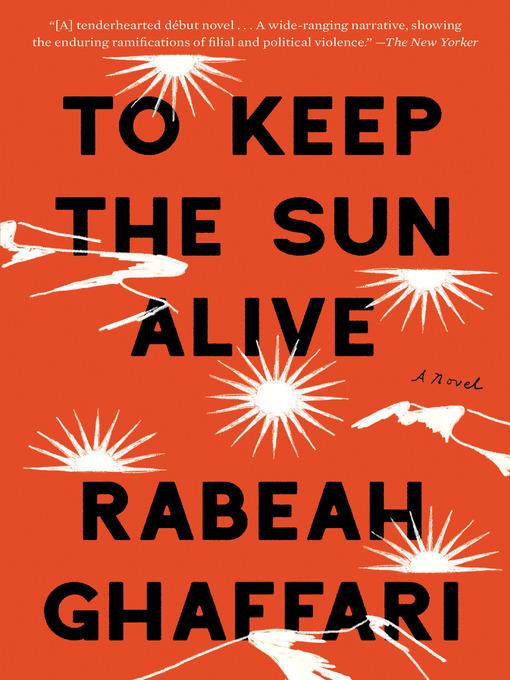
To Keep the Sun Alive
A Novel
کتاب های مرتبط
- اطلاعات
- نقد و بررسی
- دیدگاه کاربران
نقد و بررسی

October 29, 2018
A family whose members hold varying loyalties shapes Ghaffari’s evocative debut set during the Iranian Revolution. Akbar, a retired judge, and his wife, Bibi, invite their extended family for leisurely lunches at their orchard in Naishapur. Akbar’s brother Habib is a mullah who’s fond of his own voice and increasingly passionate about the need for religious cleansing. His widower nephew, Shazdehpoor, bristles at Iran’s provincialism and yearns for the charms of Europe. His two sons reject their father’s intent fastidiousness: Jamsheed through opium addiction and Madjid through his heady love affair with Nasreen. As tensions rise, the family focuses more on quotidian challenges: Bibi’s friendship with an elderly midwife, the buried disappointments of marriage, servant Mirza’s propensity for forbidden alcohol, and Bibi’s adopted son Jafar’s extreme fondness for the chickens they raise. When the revolution finally arrives, shocking, sudden violence sweeps up the family with tragic results. Ghaffari delves into her characters with sensitivity for their positions and differences. Readers will savor the emotional depth of one family’s experience of the terrifying effects of religious fundamentalism and political instability.

November 1, 2018
On the eve of the Iranian Revolution, a large extended family splinters as all of its members evaluate their places--or lack thereof--in the rapidly changing country.From a busy Parisian street corner on the day of a solar eclipse in 2012, Shazdehpoor--an elderly Iranian expatriate--reminisces about a day 30 years earlier when "the moon slowly swallowed the sun" in what now feels like an alternate universe. On that day, in a lush, apple blossom-scented orchard belonging to Bibi-Khanoom and her husband, retired judge Akbar-Agha, the family gathers for its first spring lunch. But even as they dine together, secrets and familial strife hum beneath the surface. Akbar-Agha debates the limits of governmental justice with his brother, the firebrand mullah Haj-Agha; Bibi-Khanoom's niece, Ghamar, barks at her meek tailor husband, Mohammad-Agha, masking an insidious marital conflict; and their daughter Nasreen sneaks off among the cherry trees on a tryst with Shazdehpoor's son Madjid. The absence of Madjid's opium-addicted brother, Jamsheed, is also palpable. But when a deadly conflict between two young men breaks out in the town square and inflames the bitter rift between a pro-Islamic faction and its opponents, the family is drawn into the unrest it spurs. As the mullah and Jamsheed take the side of the "martyr" who killed his "elitist" foe, Madjid--newly a university student and eager to help shape the country's future--is caught in a deadly trap by a sinister political group. When the eclipse approaches and danger spreads through the region, the family members must each weigh their allegiances to their blood and beliefs. In her lush and atmospheric debut, author Ghaffari sketches a complex portrait of a country on the brink of revolution and explores the poignant ways political unrest can bind or tear families apart. Although Nasreen and Madjid's romantic plotline sometimes veers into predictable territory, the story's generous emotional core offsets it in a nuanced, character-driven exploration of a formative moment in a country's complicated history.An evocative and deeply felt narrative portrait.
COPYRIGHT(2018) Kirkus Reviews, ALL RIGHTS RESERVED.

Starred review from November 1, 2018
Ghaffari's exciting debut is a family epic centered on several months in 1979. Each section begins in 2012 Paris, where an old man named Shazdehpoor sells calligraphy to tourists and cherishes what he has left of his native Iran. The following chapters move back in time to the lives of Shazdehpoor's family in 1979, at the beginning of the Iranian Revolution. The country is alive with the promise of change, which inspires Nasreen, who wants to escape the confining role she watched her mother occupy, and her love, Madjid, a university student who imagines the future Iran could have. Shazdehpoor's uncle, who is a retired judge, and his wife host the family for lunches in their orchard, while another uncle, a cleric, encourages the rise of religious fundamentalism. Ghaffari weaves each character's deep history into the novel, creating a very complete world. Her poetic prose relays deep and intimate emotion in a single line; its richness makes characters' joys and tragedies palpably felt by readers, too. This is a beautifully written story of a family's upheaval and its roots in their own history.(Reprinted with permission of Booklist, copyright 2018, American Library Association.)

























دیدگاه کاربران